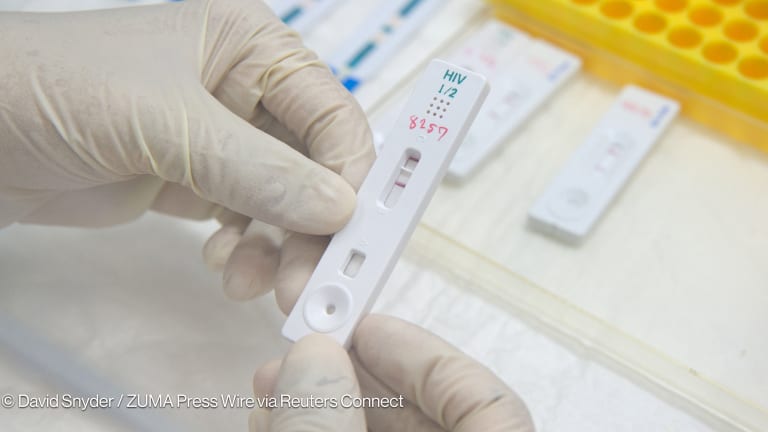
The HIV response is at a pivotal point. There is a great deal of talk and excitement about the “end of AIDS.” We have the tools, and we have the knowledge. And we have climbed this mountain for over 30 years. But the very notion of “ending the epidemic” — while cautiously optimistic and a potentially good rally cry — has the insidious side effect of not reaching the summit. For many may now think that the battle is over and that resources, political commitment and attention to one of the most devastating epidemics of our time can be sidelined.
But AIDS will not end until those at the very forefront of the epidemic — those who all too frequently the most marginalized and socially excluded and those whose voices are not sufficiently heard in the hallways of political power and influence — have access to the latest scientific and biomedical advancements that we know are so critical. And access to these will not be attained until the human rights considerations, and the inextricable links to HIV, are squarely addressed. Unless this is done, AIDS will not be over.
Words count
Human rights abuses continue to fuel the HIV epidemic with an increased effect on those with limited rights. Although there are numerous groups who face human rights obstacles — including key populations and vulnerable populations — these terms are not synonymous and should not be used interchangeably. Words count. Each group faces unique challenges. Key populations are “key” for a reason. Men who have sex with men, sex workers, transgender people, and people who inject drugs not only face HIV rates 14-50 times the general population but also are often confronted with double, triple, or quadruple compounded stigma and discrimination, which severely affects their ability to access HIV prevention and treatment resources.
The legal, social, and health challenges faced by the different key populations are similar but by no means the same. In response, we need to design and invest in strategies to address each group’s unique, nuanced needs and the human rights issues each key population group faces, actively engaging members of key population groups as principal decision-makers. For civil society is critical in the human rights response to HIV and has played an integral role in almost every success we have had in HIV for the past 30 years. Across the globe, members of key populations are organizing, fighting for protection under the law, advocating for accessible and affordable treatment and prevention services, and paving the way for human rights advancements. They need to be part of each national AIDS response from Juba to Jamaica — in words. We must strengthen our collective support for civil society human rights programming, opening doors for meaningful engagement of all key population groups. Who we focus on and how we focus must be detailed and specific. Words count.
Actions matter
See more stories on human rights:
► The most boring video on a very important human right
► Where do we stand on women's human rights?
► Equity: A platform for achieving the SDGs and promoting human rights
► Will corporate human rights reports become the norm?
► Beyond 'human rights': Finding the right language to engage communities of faith
But beyond the right words and sincere pledges of commitment, reaching the end of AIDS requires dedicated and concerted action that prioritizes key populations. UNAIDS estimates that just 0.13 percent of all funding for HIV is allocated to programming related to human rights, and there are indications that funding for this work is decreasing. Many countries previously classified as low-income have transitioned to middle-income and no longer qualify for many types of HIV funding, including resources for addressing human rights concerns. As a result, human rights initiatives may receive short shrift, despite our knowledge that human rights violations, stigma and discrimination are some of the most critical barriers to accessing HIV services.
For example, we know that reforming a punitive legal environment can play a powerful role in the well-being of key populations. Inclusive laws expand access to preventative care, improve quality of treatment, increase retention in HIV services, and allow for HIV to be more openly discussed in communities.
Actions matter. Currently, there are just two significant funders of global HIV work, U.S. President's Emergency Plan for AIDS Relief and the Global Fund. These two mechanisms — and the dedication of all who work for them — have changed the face of HIV and enabled us to even contemplate the end of AIDS. Both the PEPFAR and USAID supported LINKAGES program which is the largest dedicated global program focused on key populations and the Dutch government supported Bridging the Gaps program are examples of actions that matter.
However, we must continue to advocate for governments, international organizations, and the private sector to increase funding for focused and co-linked HIV and human rights programming that is centered around key populations. Actions matter.
In a resource constrained environment addressing everything that counts and matters is almost impossible. But our approach to HIV must not only incorporate new scientific advancements. It must also be rights-based, focusing on key populations, allocating and reallocating funds and resources to human rights programing, and supporting civil society initiatives across the globe. When it comes to summiting this mountain, let us not leave anyone behind. Especially for those key populations that carry a disproportionate HIV burden. Our words count, our actions matter.
To read additional content on global health, go to Focus On: Global Health in partnership with Johnson & Johnson.








